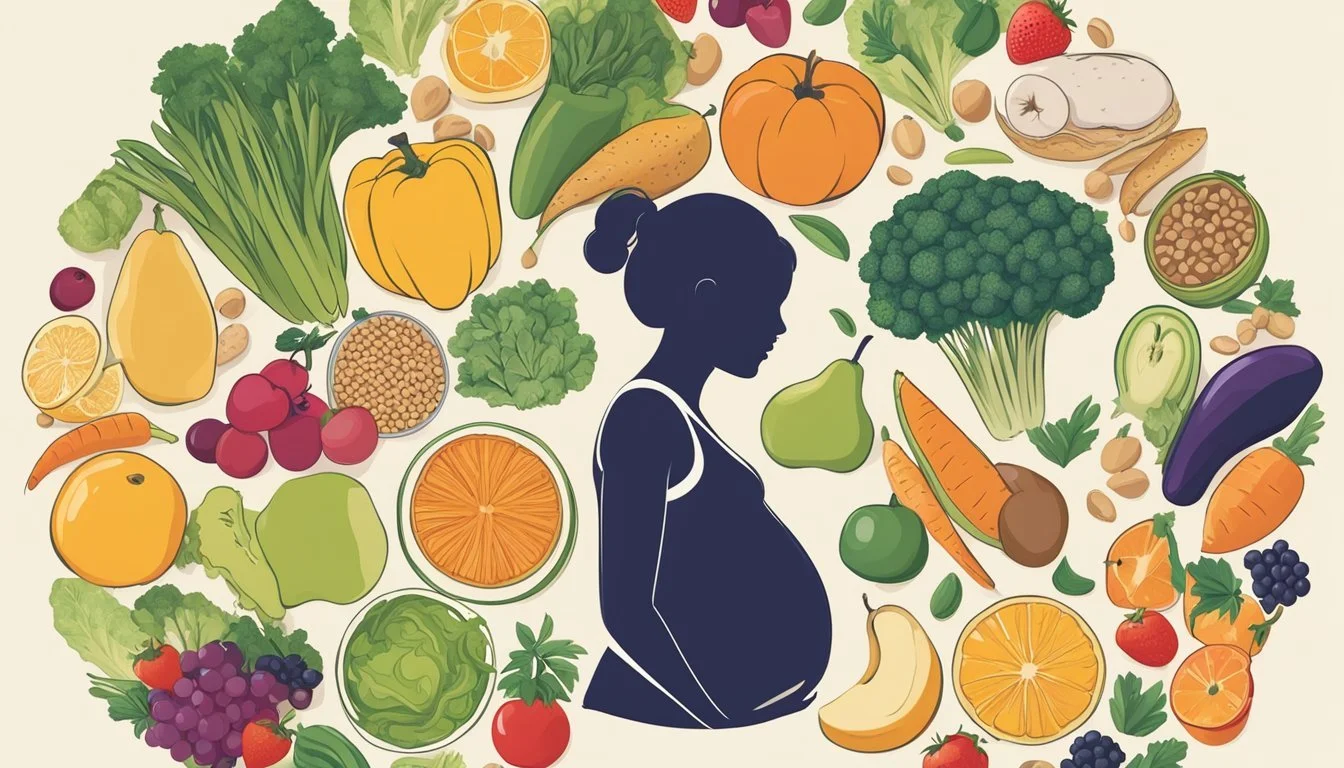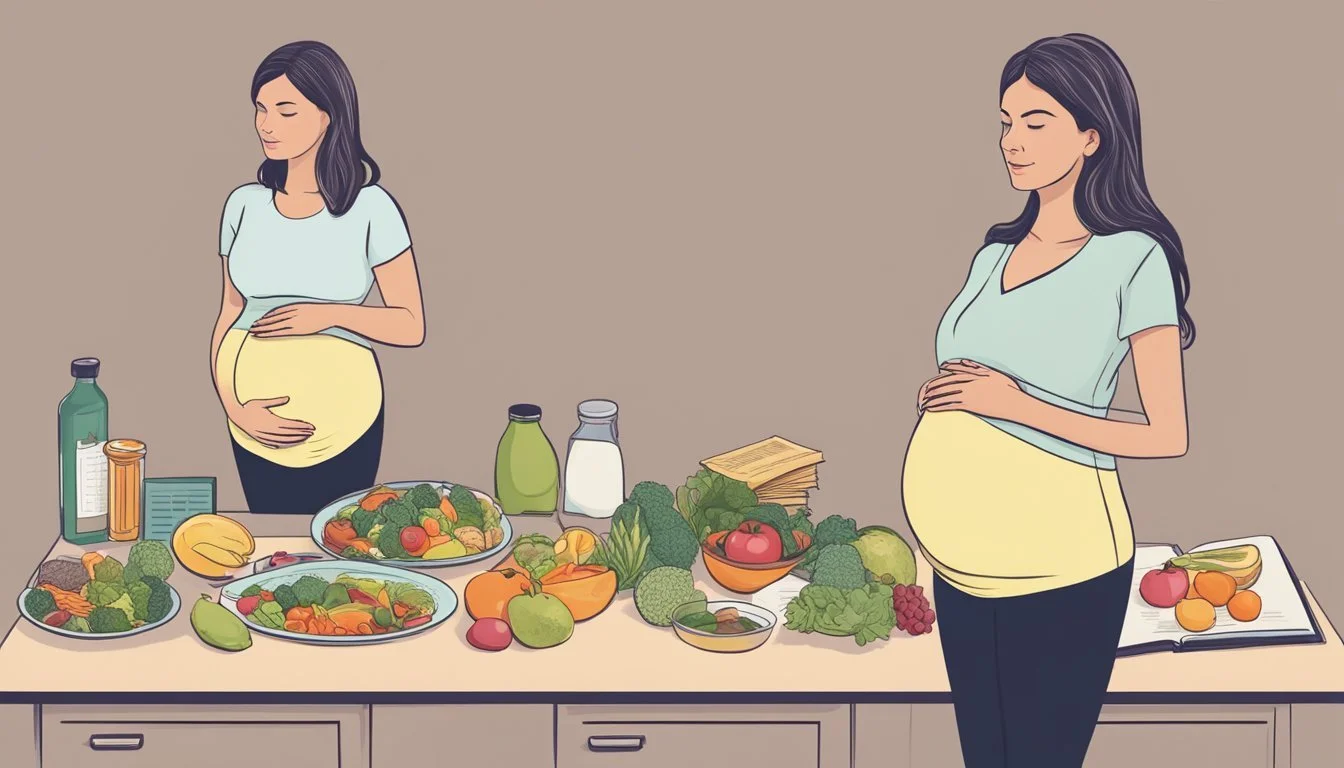Is it Safe to Follow the Zone Diet While Pregnant?
Analyzing Nutritional Balance and Risks
Maintaining a balanced diet during pregnancy is crucial for the health of both the expecting mother and the baby. Good nutrition is key, and it typically involves a mix of proteins, carbohydrates, and fats, along with vitamins and minerals found in a variety of foods. The Zone diet, a popular eating plan focused on controlling blood sugar and hormonal balance through a specific ratio of carbohydrates (40%), protein (30%), and fats (30%), claims to support overall health and weight management. However, the question arises whether this diet provides the necessary nutrients required during pregnancy.
The Zone diet's strict macronutrient balance is designed to reduce inflammation and regulate insulin levels. While these are beneficial health objectives, the diet's rigidity might make it challenging to meet the increased nutritional needs during pregnancy, especially for essential nutrients such as folic acid, iron, calcium, and DHA. Pregnant individuals need an adequate intake of these nutrients to support fetal development and their own health. For instance, folic acid is vital for preventing neural tube defects, and iron supports the increase in blood volume.
Furthermore, pregnancy is a time when caloric needs are heightened to support the growing fetus. Healthy eating during this period doesn't just focus on the type of nutrients consumed but also on the quantity. Established guidelines suggest that pregnant women typically require about 300 extra calories per day, especially during the second and third trimesters. These additional calories should come from a balanced mix of food groups to support both the mother's and baby's health, raising queries about the flexibility of predefined diets like the Zone diet to adapt to such specific and heightened nutritional demands.
What Is the Zone Diet?
The Zone Diet is a nutritional philosophy focusing on balancing macronutrient intake specifically at 40% carbohydrates, 30% protein, and 30% fat in each meal. The diet suggests that this macronutrient ratio optimizes hormonal balance, specifically insulin levels, to assist with weight management and possibly reduce inflammation within the body. It prescribes enjoying three meals and two snacks daily, with each offering a mix of these macronutrients in the stated proportions.
Carbohydrates: The diet emphasizes consuming carbohydrates with a low glycemic index to maintain stable blood sugar levels.
Protein: It recommends a moderate protein intake tailored to individual needs, usually calculated based on one's activity level and lean body mass.
Fat: Healthy fats, particularly monounsaturated fats, are encouraged to satisfy the remainder of the caloric intake.
The Zone Diet does not strictly forbid any foods, but it prioritizes food choices that are thought to work together to help maintain hormonal balance. It is suggested that followers start each meal or snack with a low-fat protein source, complemented by carbohydrates primarily from fruits and vegetables, and finish with fats that are low in omega-6 fatty acids to align with the Zone's guidelines.
Followers typically measure food portions using the "hand-eye method" or "block method" to ensure they are eating the right balance of macronutrients. By distributing meals throughout the day, the diet aims to keep hunger at bay and energy levels stable, ideally at regular intervals of every four to six hours after a meal, or every two to two and a half hours for a snack.
Nutritional Needs During Pregnancy
During pregnancy, a woman's body requires additional nutrients to support the growing fetus. It is essential to focus on a diet rich in vitamins, minerals, proteins, and carbohydrates to meet these increased demands.
Vitamins and Minerals
Pregnant women should ensure they receive adequate folic acid, iron, calcium, and vitamin D.
Folic Acid: Essential for fetal development, reducing the risk of neural tube defects. Recommended: 600 mcg/day.
Sources: Leafy green vegetables, citrus fruits, beans.
Iron: Supports the development of the placenta and fetus and helps prevent anemia. Recommended: 27 mg/day.
Sources: Red meats, poultry, fortified cereals.
Calcium: Vital for building strong bones and teeth, and for muscle and nerve function. Recommended: 1,000 mg/day.
Sources: Dairy products, broccoli, kale.
Vitamin D: Aids in calcium absorption and bone health. Recommended: 600 IU/day.
Sources: Sunlight, fatty fish, fortified milk.
Proteins and Fats
Proteins and fats are crucial for the baby’s growth and brain development.
Proteins: Required for the growth of fetal tissue, including the brain. Recommended: 75 to 100 grams/day.
Sources: Lean meats, eggs, dairy, legumes.
Fats: Should focus on healthy fats for energy and development. Avoid high amounts of saturated fats.
Sources: Avocado, nuts, seeds, olive oil.
Carbohydrates and Fiber
Carbohydrates provide essential energy, while fiber aids in digestion and can help prevent constipation, a common issue during pregnancy.
Carbohydrates: Choose complex carbohydrates for sustained energy. Recommended: Focus on whole grains.
Sources: Whole grain breads, cereals, pasta, rice.
Fiber: Important for bowel health. Recommended: 28 to 34 grams/day.
Sources: Fruits, vegetables, whole grains, legumes.
Analyzing the Zone Diet's Compliance with Pregnancy Nutrition
When considering the Zone diet during pregnancy, it's essential to understand if it provides the balanced nutrition a pregnant individual requires. This section will examine the diet's macronutrient distribution and its ability to deliver key nutrients vital for fetal development.
Macronutrient Balance
The Zone diet emphasizes a specific distribution of macronutrients at each meal, typically 40% carbohydrates, 30% protein, and 30% fat. For pregnant individuals, the diet's structured plan can aid in maintaining blood sugar levels and controlling weight gain. However, it's critical to ensure that the carbohydrates consumed are from nutrient-dense sources rich in fiber, such as fruits, vegetables, and whole grains, rather than from refined sugars and processed foods.
Pregnancy nutrition guidelines suggest a balanced intake of macronutrients tailored to support the metabolic changes and increased energy needs during pregnancy. Below is a comparison of the Zone diet's recommended macronutrient balance with general pregnancy nutrition guidelines:
Nutrient Zone Diet Recommendation Pregnancy Nutrition Guideline Carbohydrates 40% 45-65% Protein 30% 10-35% Fats 30% 20-35%
Key Nutrients for Fetal Development
Folic Acid: Adequate intake of folic acid before conception and during early pregnancy helps prevent neural tube defects. The Zone diet must be assessed for its ability to supply the recommended 600 micrograms of folic acid per day through its permitted food items.
Iron: Pregnant individuals require more iron to support increased blood volume and the fetus's development. The Zone diet should allow for food sources rich in iron, such as lean meats, spinach, and legumes, to meet the increased demand for at least 27 milligrams of iron daily.
Calcium: Essential for the development of the fetal skeleton, calcium needs are heightened in pregnancy. The individual would need to incorporate calcium-rich foods like dairy products, fortified foods, or supplements within the Zone diet's framework to achieve the recommended intake of 1,000 milligrams per day.
DHA: For brain development and the health of the mother, docosahexaenoic acid (DHA), a type of omega-3 fatty acid, is vital. The Zone diet's fatty acid ratio should be scrutinized to ensure sufficient provision of DHA, which is typically sourced from fish low in mercury and certain algae.
In sum, the Zone diet's compliance with pregnancy nutrition centers on its ability to adapt to the heightened demand for specific macronutrients and key vitamins and minerals. Pregnant individuals following this diet must carefully plan and possibly supplement their meals to align with these unique nutritional needs.
Potential Benefits of the Zone Diet During Pregnancy
The Zone diet is a balanced eating plan that emphasizes a ratio of 40% carbohydrates, 30% protein, and 30% fats in each meal and snack. This balance aims to stabilize blood sugar levels, which can contribute to sustained energy and may prevent the highs and lows often associated with eating high-sugar or high-starch meals.
Healthy eating habits are crucial during pregnancy, not only for the mother's well-being but also for the baby's development. The proportion of nutrients suggested in the Zone diet aligns with a structured approach to eating, ensuring that pregnant women can derive a broad spectrum of vitamins, minerals, and macronutrients essential for fetal development.
Here are potential benefits of following the Zone diet during pregnancy:
Controlled Blood Sugar: Steady glucose levels can reduce the risk of gestational diabetes.
Consistent Energy: Regular intake of balanced meals may help in maintaining energy levels.
Healthful Weight Management: Proper portion control can aid in preventing excessive weight gain.
Nutrient-Dense: A focus on whole foods increases the intake of essential nutrients needed for fetal growth.
While there are potential benefits, pregnant women should consider their unique nutritional needs and consult healthcare professionals before adopting the Zone diet or any other nutrition plan. It is important to ensure that the diet is providing enough calories and nutrients such as folic acid, which is critical for the prevention of neural tube defects, and other key pregnancy nutrients.
Please note that individual adjustments might be necessary to meet these increased nutritional requirements during pregnancy.
Risks and Considerations for Pregnant Women
When considering the Zone diet during pregnancy, it is imperative to understand the potential risks it may pose to both maternal health and fetal development. Nutritional balance is crucial for a healthy pregnancy.
Risk of Nutrient Deficiencies
The Zone diet, which focuses on a 40:30:30 ratio of carbohydrates to proteins to fats, could lead to nutrient deficiencies during pregnancy. It might not provide an adequate intake of essential nutrients required for fetal development, such as:
Folic Acid: Critical for preventing neural tube defects
Iron: Essential for increasing blood volume and preventing anemia
Calcium: Vital for bone development
Vitamins: Diverse needs including Vitamin D for bone health and Vitamin C for tissue repair and iron absorption
Focus on Balance: Pregnant women should ensure that their diet includes a variety of nutrients from different food groups to support the growth and development of the fetus.
Food Safety Concerns
Pregnant women must exercise caution with food choices due to the risk of foodborne illnesses, which can be harmful to both the mother and fetus. Key safety concerns include:
Listeria: Found in unpasteurized dairy products and certain ready-to-eat foods, listeria can cause serious infections.
Mercury: High levels found in certain fish can negatively impact fetal brain development.
Safe Practices:
Cooking meat thoroughly: To avoid toxoplasmosis and other pathogens.
Avoiding high-mercury fish: Such as swordfish, king mackerel, and tilefish.
Choosing pasteurized products: To minimize the risk of bacterial infections.
Food Groups and Choices in the Zone Diet
The Zone Diet emphasizes a balanced intake of proteins, carbohydrates, and fats at every meal. It recommends specific foods within these groups to maintain a 40% carbohydrate, 30% protein, and 30% fat ratio.
Protein-Rich Foods
In the Zone Diet, lean protein sources are fundamental. They should be included in every meal to align with the diet's protein requirements. Options include:
Meat: Preferably lean cuts of beef and pork.
Poultry: Skinless chicken and turkey breasts.
Fish: Salmon, trout, and other fatty fish high in omega-3 fatty acids.
Dairy Products: Low-fat milk, cheese, and yogurt.
Protein portions are determined based on an individual's lean body mass and activity level.
Low-Glycemic Carbohydrates
Carbohydrates in the Zone Diet should primarily come from vegetables and fruits that have a low glycemic index. This promotes stable blood sugar levels. Suggested choices are:
Vegetables: Leafy greens, bell peppers, and other non-starchy options.
Fruits: Berries, apples, and oranges, favoring those lower in sugar.
Grains: Though used sparingly, whole grains like oatmeal and barley are acceptable.
These carbohydrate sources are rich in fiber and nutrients, providing the necessary energy without spiking insulin.
Healthy Fats and Oils
The Zone Diet encourages the consumption of fats that have anti-inflammatory properties. Healthy fats are included at each meal and may consist of:
Oils: Olive oil, avocado oil, and other monounsaturated fats.
Nuts: Almonds, walnuts, and pistachios; preferably unsalted.
Seeds: Flaxseeds and chia seeds, which are also rich in omega-3.
The selection and portioning of fats are crucial to the diet's success, aiming to support heart health and reduce inflammation.
Adjustments to the Zone Diet for Pregnancy
When a woman is pregnant, her dietary requirements change to support the growing fetus. The Zone Diet, focused on balanced macronutrient distribution, may need certain modifications to meet these new nutritional demands.
Increasing Caloric Intake
Pregnant women generally need to increase their caloric intake, typically by an additional 300-500 calories per day during the second and third trimesters. The Zone Diet’s structured meal planning should accommodate this increase to ensure sufficient energy. Specifically, this might involve slightly larger portion sizes or incorporating more frequent snacks throughout the day in accordance with Zone Diet principles.
Incorporating Prenatal Vitamins
Prenatal vitamins are critical for filling any nutritional gaps which might be present in a pregnant woman's diet. These supplements should contain key vitamins and minerals including folic acid, iron, and calcium. While the Zone Diet promotes a balance of nutrients, the exacting needs of pregnancy often require the additional insurance that prenatal vitamins provide.
Emphasizing Essential Nutrients
Pregnancy demands a heightened focus on certain nutrients that are particularly crucial for fetal development:
Folic Acid: Essential for preventing neural tube defects, its intake should be at least 600 mcg during pregnancy. Foods high in folate, like leafy greens and citrus fruits, should be emphasized within the Zone Diet framework.
Calcium: Vital for the developing baby's bones, a pregnant woman should aim for at least 1,000 mg of calcium per day. Incorporating low-fat dairy products can help meet this need.
Iron: Important for preventing anemia and supporting the baby’s growth and brain development, the needed iron intake increases to about 27 mg per day during pregnancy. Lean meats and legumes can be good Zone-compliant sources.
These nutrients not only support the baby's health but also aid in the mother’s well-being throughout pregnancy. It's always recommended that pregnant women consult with healthcare providers to personalize their dietary plans.
Alternatives to the Zone Diet for Expectant Mothers
When considering nutrition during pregnancy, healthy eating habits and prenatal nutrition are paramount. Expectant mothers require a balance of proteins, carbohydrates, and fats, as well as a rich array of vitamins and minerals. The Zone diet's strict macronutrient ratios may not suit all pregnant women due to individual nutritional needs and preferences.
Dietary Guidelines for Pregnancy:
Balance and Variety: Emphasizing fruits, vegetables, whole grains, and lean proteins.
Frequency: Small, frequent meals throughout the day to support consistent energy levels and minimize nausea.
Alternative Diets:
Mediterranean Diet: Rich in fruits, vegetables, whole grains, and healthy fats from fish and olive oil.
Vegetarian Diet: Can be healthful when well-planned to include diverse sources of protein, iron, and B12.
DASH Diet: Focuses on lowering sodium and increasing nutrient-rich foods that are essential for blood pressure regulation in pregnancy.
It's important for pregnant women to consult healthcare professionals when choosing a diet. Nutrient needs vary, especially for iron, calcium, folic acid, and omega-3 fatty acids. They should ensure any dietary approach includes:
Adequate Calories: Enough energy for fetal development, which is typically an increase in daily intake.
Essential Nutrients: Customized prenatal vitamins may be recommended.
While the Zone diet provides structured eating habits, alternative diets may offer more flexibility and adequacy for pregnancy nutrition. It is vital to choose a diet that supports both maternal health and fetal development.
Conclusion: Making Informed Decisions About Diet During Pregnancy
When considering diet during pregnancy, one must prioritize health and nutrition. The Zone diet, which emphasizes balanced proportions of carbohydrates, proteins, and fats, may appeal to some as a structured approach to eating. However, pregnant women should carefully assess any diet to ensure it meets the increased nutritional needs essential for fetal development.
Informed decisions during this critical period are paramount. They should involve:
Consulting with healthcare providers: to tailor dietary plans to the individual’s health status and nutritional needs.
Considering guidelines: that recommend a variety of nutrients and vitamins, including folic acid, iron, and calcium.
Evaluating dietary patterns: to avoid restrictive or insufficient diets harmful to maternal and fetal health.
Understanding the risks: of both undernutrition and overnutrition.
In summary, while adherence to a healthy dietary pattern is important, any diet during pregnancy should be flexible enough to meet both the mother’s and baby’s needs. Rather than following diets designed for weight loss or specific macronutrient balances such as the Zone diet, pregnant women are encouraged to adopt a balanced and nutrient-dense diet to support a healthy pregnancy.










